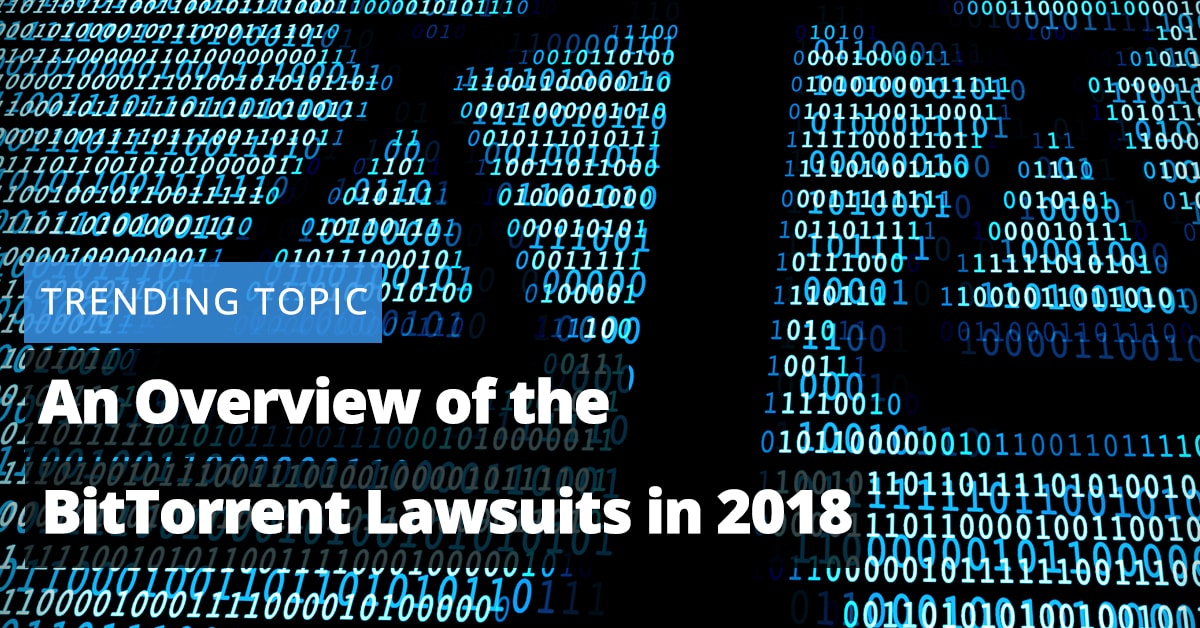
File-sharing is nothing new. Napster essentially pioneered a new industry on its platform, which became the flagship for peer-to-peer (P2P) computing. People made their own media available for others across the world to download at no cost to either party. As times change, so does technology, and as Napster slipped into the annals of history, BitTorrent arose to take its place.
The key difference between the two is in the way files are downloaded. With Napster, an entire file, a song, for instance, was downloaded from one user to another. BitTorrent made it possible to download files one piece at a time so that no single user is required from start to finish; rather, any number of individuals across the service can play host to the file’s bits and pieces. As those bits and pieces flew from computer to computer, however, the media companies were taking note and preparing lawsuits to make BitTorrent part of the Napster past. BitTorrent lawsuits in 2018 became something of a cottage industry, as more were filed than in any previous year.
No Such Thing As a Free Lunch
The issue, as mentioned briefly above, is the lack of an official transaction taking place. There is no payment from the receiver to the manufacturer or creator of the media in question, only the “free” transmission of files across the Internet’s vast network. This is also the allure of such a service, of course. In other words, why pay for something when you can get it for free?
Of course, I’m being facetious. The matter is a major issue for attorneys all over the United States. On the one side are lawyers suing on behalf of artists, creators, and media conglomerates. On the other are attorneys whose job it is to defend the vast swathes of the public who have downloaded copious amounts of content — music, movies, video games, computer applications, etc. — without paying for it first.
These cases are usually referred to as copyright troll lawsuits. A media company claims that “John Doe” infringed on their copyright via the transmission of some form of media without lawful authority to do so. Many early BitTorrent cases would attempt a sort of reverse class-action suit, in which hundreds or thousands of people would be sued for copyright infringement. That, however, is no longer the case. Newer lawsuits are more often brought against a single individual (or a handful at most) accused of file-sharing. It stands to reason, then, that the quantity of these cases has grown exponentially in recent years.
BitTorrent Cases
According to one source, over three thousand separate copyright infringement suits were filed in the year 2018 alone. For comparison, during the previous year only about a thousand such cases were brought forth. The proliferation of these lawsuits has caught the eye even of the Ninth Circuit Court of Appeals, in which it was declared that more than a simple IP-address would be required in order to issue a verdict against any particular defendant. This sets a curious precedent of which attorneys across the spectrum should take note. The decision of the District Judge, Michael H. Simon, reads (in part), “Because multiple devices and individuals may be able to connect via an IP address, simply identifying the IP subscriber solves only part of the puzzle. A plaintiff must allege something more to create a reasonable inference that a subscriber is also an infringer.”
It is this something more that is open to question and debate. Judge Simon writes that “without allegations of intentional encouragement or inducement of infringement, an individual’s failure to take affirmative steps to police his internet connection is insufficient to state a claim”. So, what exactly would constitute substantial and conclusive proof that a certain individual is the perpetrator of the alleged act of copyright infringement?
Conclusion
Attorneys on both sides of the discussion will have to sort through the decision. Determining exactly how it will relate to individual lawsuits will, of course, be practiced (if not wholly resolved) on a case-by-case basis. Legal professionals from paralegals to lawyers to judges must now work through the meaning of Judge Simon’s opinion and the precedent that it sets moving forward. The only thing clear so far is that what it means for media companies and the general public has yet to be decided.




